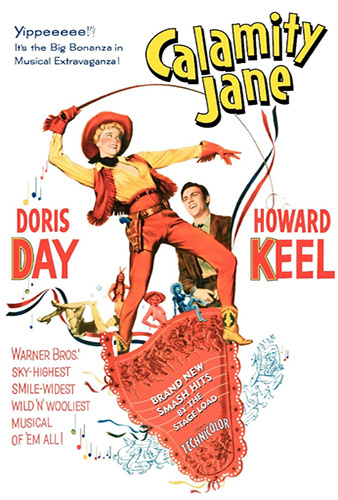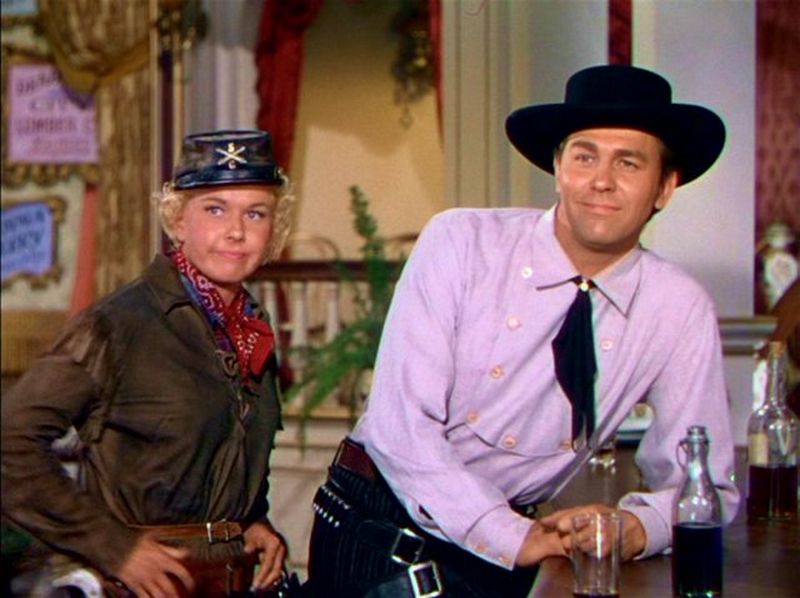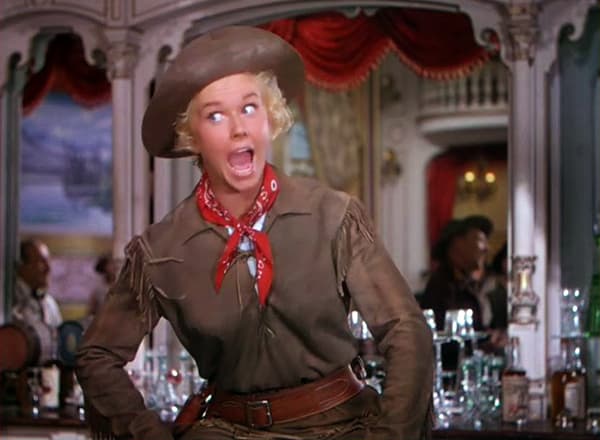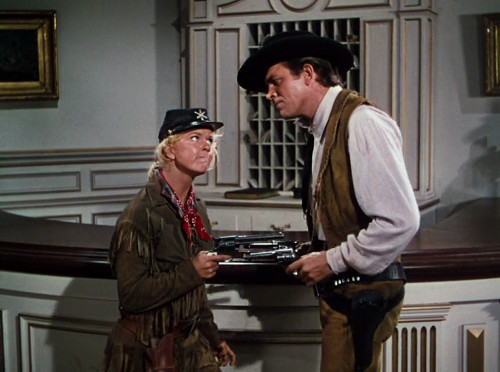We're celebrating musical star Howard Keel's Centennial this week. Here's Tim Brayton...
 Presenting a musical in which Howard Keel plays the obnoxious gunslinger love interest to a famous woman from the Wild West. My apologies if you feel a little bit of déjà vu from that logline: Nathaniel did, after all, just write about Keel's breakout performance in 1950's Annie Get Your Gun, about which every word of that sentence equally applies. And that's absolutely no accident. Warner Bros. had fought to get the rights to that stage musical as a vehicle for its up-and-coming singing star Doris Day, but lost out to MGM. When that film proved to be a hit, Warner's responded by developing an original Western musical based - oh so very loosely - on the life of Calamity Jane, famous frontierswoman and scout.
Presenting a musical in which Howard Keel plays the obnoxious gunslinger love interest to a famous woman from the Wild West. My apologies if you feel a little bit of déjà vu from that logline: Nathaniel did, after all, just write about Keel's breakout performance in 1950's Annie Get Your Gun, about which every word of that sentence equally applies. And that's absolutely no accident. Warner Bros. had fought to get the rights to that stage musical as a vehicle for its up-and-coming singing star Doris Day, but lost out to MGM. When that film proved to be a hit, Warner's responded by developing an original Western musical based - oh so very loosely - on the life of Calamity Jane, famous frontierswoman and scout.
So eager was the studio to recreate that Annie magic that they even went to the trouble of borrowing Keel from MGM for the span of this one production. Not that you could tell any of this just by looking at 1953's Calamity Jane...

Director David Butler and producer William Jacobs, with his final film in a 20-year career (he died before it was released) were copying the approach of MGM's legendary Freed Unit pretty closely. They sank money into gorgeous costumes and sets to bring 1870s Deadwood, South Dakota to life with splendidly bright colors that do not in any meaningful way evoke the historical American West. Which is just as well, because there's not one blessed part of the movie that's historically accurate otherwise.
We're here to celebrate Keel, but there's not any point in pretending that this is anything other than Doris Day's film, from top to bottom. She's giving it her all, if not more: the fim may be a pack of cheerfully bald-faced lies, but it's not so brazen as to deny that Calamity Jane was a rough, guttural, crude figure, and Day is having an obviously great time going to town on Jane's rough, barking voice, while squaring her jaw and mugging like her life depended on it.

Good or bad - I think I'm inclined to call it "good" (it is, at least, damned interesting) - Day's performance overwhelms everything else in Calamity Jane. This is helpful, in some ways: the script is very oddly-shaped, rushed and episodic, and it leaves very little room for character arcs. Day's performance removes the need for anything so fussy as a "character arc."
But it is disappointing in other ways, one of which is how little Calamity Jane gives Keel to do, as the antagonistic love interest who keeps disappearing in the first half of a movie that is far more invested in its homoerotic implications than its obligatory heterosexual pair-bonding (it comes about as close to explicitly giving Jane a girlfriend as a 1953 American film was ever going to come).

I say this is disappointing, because even in bite-sized form, this actually turns out to be one of Keel's strongest performances. Certainly, comparing it directly to his work in Annie Get Your Gun (and how are we to avoid doing that?), his work as a thoroughly ahistorical figure sharing the name of Wild Bill Hickok is substantially more impressive. Speaking as someone who has always found Keel's rakes to be more abrasive than charming, I was unprepared for the ebullience of his Hickok.
Like Day does with Jane, Keel starts with crude loutishness, allowing us to see what a rough jerk Hickok could be, but wrapping it in an incredible amount of energy and good humor. Throughout, he goes for big, snarling reactions, such as in a scene where Jane mocks him for holding a baby on his lap, and Keel and Day seem hellbent on providing an escalating series of huge cartoonish line deliveries. It's the opposite of subtlety or nuance, but in a film as nutty as Calamity Jane, it's the only choice to stand out as a suitably mythic figure to be worthy of Jane's eventual affections.
Somehow, despite the speed with which Keel's bass-baritone voice became iconic, Calamity Jane only gives him one number (discounting a featured moment in a group number), the romantic ballad "My Heart Is Higher Than a Hawk (Deeper Than a Well)."
It's a fine showcase for Keel's voice, letting him belt out his romantic yearning through lyrics that are particularly conducive to acting, rather than just singing. But like most of the music in Calamity Jane, other than the Oscar-winning "Secret Love," it would take a generous viewer to call this particularly memorable. And this is, again, the only musical showcase Keel gets in the picture. Instead, the film asks him to make an impression based solely on his ability to lean into comic caricature, and match Day's go-for-broke exaggeration. It's not a skill he had to exercise too often, but he turns out to be extremely good at it, and while Calamity Jane is still ultimately within his wheelhouse, it does suggest the outlines of a Howard Keel star persona from some strange but appealing alternate universe.